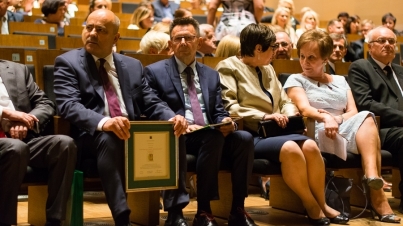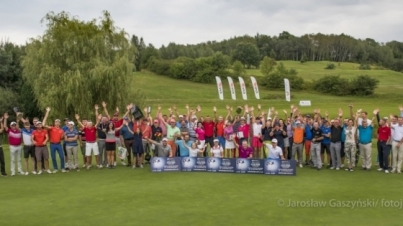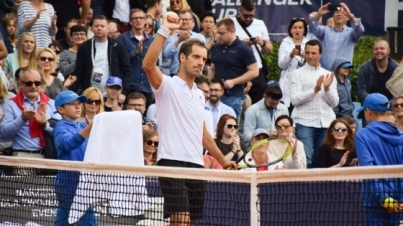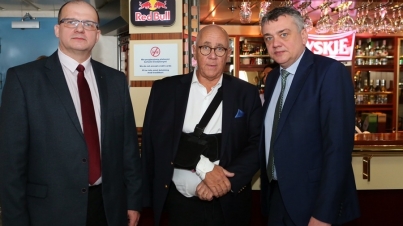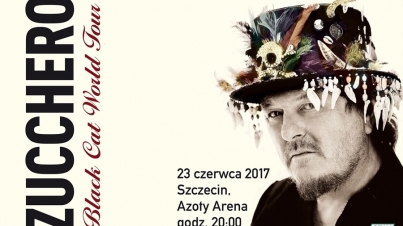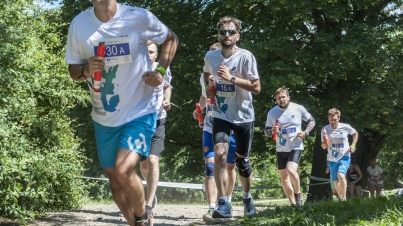News
News
People
Presentations
After Hours
Calendar
Currencies
Galleries
Advertising
About us
Contact
Adressess
Newsletter
Geopolitics and the Media
2nd Polish-German Media Days in Szczecin attracted famous politicians and journalists.
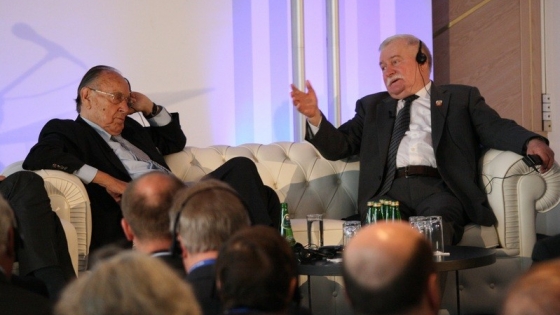 Hans-Dietrich Genscher and Lech Wałęsa /mab/
Hans-Dietrich Genscher and Lech Wałęsa /mab/
“20 years later...” was the motto of the 2nd Polish-German Media Days, which started in Szczecin on 17 June. Apart from other attractions, there were panel discussions, the ceremony of granting the Polish-German media award and a first-night performance of the “Szczecin Symphony” composed specially for this occasion by Friedrich Schenker.
One of the discussions was a media panel dedicated to the press market in times of crisis. Jerzy Baczyński, the Editor in Chief of “Polityka”, the best selling Polish weekly, Christoph Keese, responsible for foreign relations in Axel Springer (publisher of “Dziennik” daily, “Newsweek” weekly and “Fakt” daily) and Jean-Luc Testault, the Editor in Chief of Agence France Presse in Paris shared the experience from their countries. The speakers noticed similar trends: the increasingly popular Internet reduces printed press revenues from advertising and the media market is getting tabloidized.
"In the current situation, cost cutting is a survival strategy also for us. Still, publishing houses cut all expenses except those on Internet activities, in which they invest. Consequently, the gap between the profitable printed press and the Internet generating no profit is widening," says Jerzy Baczyński. In his opinion, expanding operations of media firms is another possible strategy. “Polityka”, for example, publishes books and jazz music records. However, Christoph Keese thinks that important titles will survive in the market. They may still change hands, though, which implies certain threats.
"If, for instance, an armaments concern started to invest in the media and publish a newspaper, it would constitute a threat to media quality and democracy," says Keese. During the discussion concerning the tabloidization of the press, the Editor in Chief of “Polityka” provoked comments of the representative of Axel Springer saying: "Closing “Dziennik” and survival of “Fakt” is a clear proof of media tabloidization. Launching “Fact” caused a lot of evil – envy, voyeurism, hatred. “Fact” is not a newspaper – it is a project aimed at earning money. It is purely cynical."
"Tabloids are published all over the world. They do not affect the sale of the broadsheets," answered Keese. "We face the same problems on both sides of the border. It is a clear sign that the media market transgresses the borders between our countries," concluded Bogusław Chrabota from Polsat.
Weimar Triangle and How to Talk with the USA
Lech Wałęsa and Hans-Dietrich Genscher, the former Minister of Foreign Affairs in Germany discussed the 20th anniversary of the first free election. The panel host, tv journalist Tomasz Lis, asked for their opinion concerning the article in “Der Spiegel”, which stirred much controversy and caused outrage among Polish politicians. The article concerned the participation of countries under the Nazi occupation in the extermination of Jews.
"I lost father in the war, but we should not reproach one another for past events forever. We should close this subject and start talking about the future," commented Lech Wałęsa.
"Der Spiegel" is not the voice of the German nation," said Genscher. "We should also remember of our right to the freedom of speech."
The discussion between German correspondents in Poland and the USA and Aleksander Kwaśniewski and Janusz Reiter, the former Polish ambassador in Berlin, concerned Polish-French-German cooperation and different positions of Poland and Germany regarding the war in Iraq and Europe-USA relations.
"All European countries try to curry favor with the United States. I have observed it in Washington, where, for instance Denmark, a country much smaller than Poland is considered a significant player in terms of renewable energy and the Danish Prime Minister discusses this issue with the President of the United States," says Janusz Reiter.
2th Polish-German Media Days were organized by the Fundacja Współpracy Polsko-Niemieckiej (Polish-German Coordination Foundation) and Robert Bosch Foundation.
Michał Abkowicz


































